Austrian actor, theatre impresario and director Peter Weck (1930) appeared in more than 100 films. With his natural acting style in costume dramas and Heimatfilms, he became the Wiener Goldjungen (the Golden Boy from Vienna).
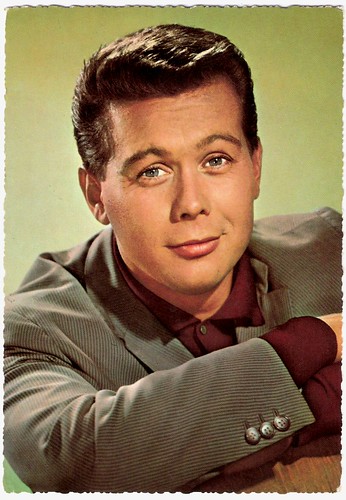
German postcard by Krüger, no. 902/108. Photo: Bavariafilm. Publicity still for Junge Leute brauchen Liebe/Young People Need Love (Géza von Cziffra, 1961).
Peter Weck was born in Wien (Vienna), Austria, in 1930. At the age of 9, he became a member of the famous Wiener Sängerknaben (Vienna Boy's Choir), where he sang as a soprano soloist till 1940.
From 1949 to 1951, he studied piano, clarinet and bassoon at the Universität für Musik und darstellende Kunst Wien (Academy for Music and Performing Arts, Vienna). He stopped his musical studies and instead decided to become an actor. In 1953, he graduated at the Max Reinhardt Seminar of the same academy in Vienna.
After his stage debut in 1953 as Truffaldino in Carlo Goldoni's Servant of Two Masters at the Stadtheater Klagenfurt. During the 1950s, he also performed in Munich, Hamburg and Vienna. From 1959 till 1970, he played at the renowned Burgtheater in Vienna, where he also worked as a director. Between 1965 and 1976, he also worked for the Schauspielhaus in Zurich.
Like Romy Schneider he was discovered for the cinema by star maker Ernst Marischka. In 1954 he made his film debut in Bruder Martin/Brother Martin (Axel von Ambesser, 1954) with Paul Hörbiger.
Weck was often seen in uniform in costume dramas. Refreshingly natural and without pathos he performed such roles as Prince Heinrich von Oranien in Mädchenjahre einer Königin/The Story of Vickie (Ernst Marischka, 1954), and archduke Carl-Ludwig in Sissi (Ernst Marischka, 1955).
He also appeared in many Heimatfilms of the 1950s like Und der Himmel lacht dazu/And Love Laughs at it (Robert A. Stemmle, 1954), and Die Wirtin zur goldenen Krone/The Innkeeper of the Golden Crown (Theo Lingen, 1955).
In Die liebe Familie/Dear Family (Helmut Weiss, 1957), he combined boyish charm with energy and common sense. This unusual quality for a jeune premier made him soon the beloved Wiener Goldjungen of the German speaking entertainment cinema.
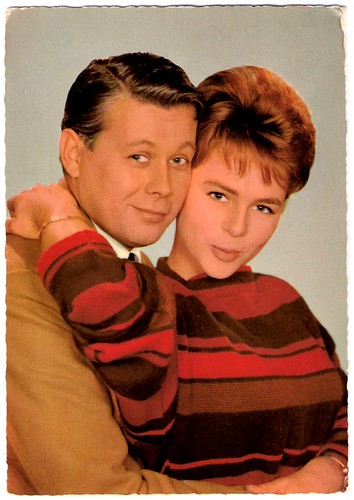
Dutch postcard. Sent by mail in 1964.
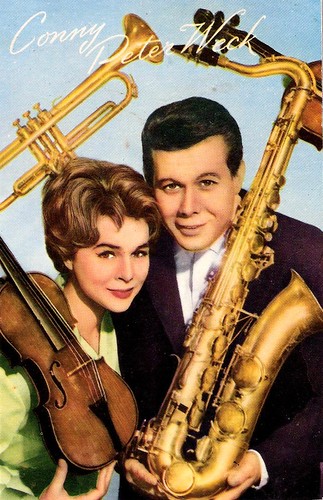
Dutch postcard.
Peter Weck intensified his film work in the 1960s, and he became a darling of the female public as the sympathetic Filou in Mariandl (Werner Jacobs, 1961) at the side of Conny Froboess.
Peter and Conny were co-stars in a series of Schlagerfilms: Wenn das mein großer Bruder wüßte/When My Big Brother Knew (Erik Ode, 1959), Meine Nichte tut das nicht/My Niece Doesn't Do That (Franz Josef Gottlieb, 1960), Junge Leute brauchen Liebe/Young People Need Love (Géza von Cziffra, 1961), Mariandl (Werner Jacobs, 1961), Der Traum von Lieschen Müller/The Dream of Lieschen Mueller (Helmut Käutner, 1961), Der Vogelhändler/The Bird Seller (Géza von Cziffra, 1962), Mariandls Heimkehr/Mariandl's Return (Werner Jacobs, 1962), and Ist Geraldine ein Engel?/Is Geraldine an Angel? (Steve Previn, 1963).
Stephanie D'heil writes at her website Steffi-line, that the media reported about a relationship between the two young stars, and they even suggested that they were engaged.
But in 1966 Peter Weck met former model Ingrid Muttone in the cafeteria of the Burgtheater. In 1967, she became his wife and they would have two children, Barbara and Philipp Daniel.
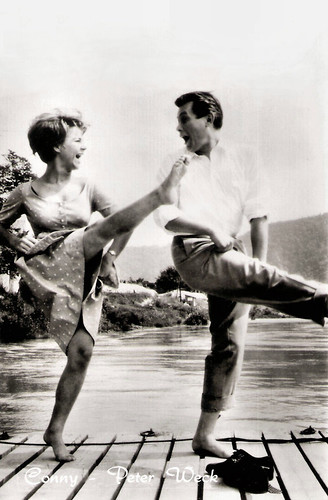
Dutch postcard by Int. Filmpers, Amsterdam, no. WPS 168. Photo: Centrafilm. Publicity still for Mariandl (Werner Jacobs, 1961).

Dutch postcard by Uitgeverij Takken, Utrecht, no. AX 4899. Photo: Hafbo Film. Publicity still for Junge Leute brauchen Liebe/Young People Need Love (Géza von Cziffra, 1961).
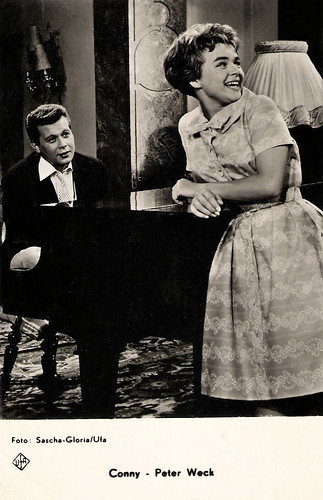
Dutch postcard by Gebr. Spanjersberg N.V., Rotterdam, no. 1314. Photo: Sascha-Gloria/Ufa.
One of Peter Weck’s best roles was in The Cardinal (Otto Preminger, 1963) opposite Romy Schneider. He played a Jewish man who became so desperate after the Austrian Anschluss in 1938 that he committed suicide by jumping out of the window.
Later Weck worked in light entertainment films by directors like Franz Antel, Franz Josef Gottlieb, Harald Reinl, and especially Harald Vock.
In 1971 he became very popular as the partner of Fritz Eckhardt in the TV series Wenn der Vater mit dem Sohne/When Fathers and Sons. Another popular series was Ich heirate eine Familie/I Married a Family (1983), which he directed, and in which he also performed the role of the pater familias. The series won the Goldene Kamera award twice, in 1985 and 1986.
From 1983 till 1992 he also worked as the impresario of the Theater an der Wien in Vienna. During this period, the theatre was the location for some important premieres such as the German versions of the musicals Andrew Lloyd Webber's Cats (1983) - which was a huge success, Freudiana (1990) - which he also directed, and Elisabeth (1992). The latter, about the life of Austrian empress Elisabeth (Sissi), was performed in Vienna till 1998, without a break.
In 1993 Weck received the Ehrenkreuz für Wissenschaft und Kunst, Austria's highest decoration for scientists and artists. Many other awards and honours followed.
His last film appearance was in 1999 in the remarkable WWII love story Aimée & Jaguar (Max Färberböck, 1999). But Peter Weck is still working for TV, both as an actor and a director.
Since 1998, Peter Weck is the grandfather of Timon. In 2010, he published his memoirs War's das?: Erinnerungen (Was that it? Memories). Two years later, in 2012, his wife, Ingrid Weck, passed away.
His most recent screen role was in Erinnern/Recall (Michael Riebl, 2013), an episode of the Austrian crime series Schnell ermittelt/Fast Forward (2009-2013). Peter Weck lives in Vienna.
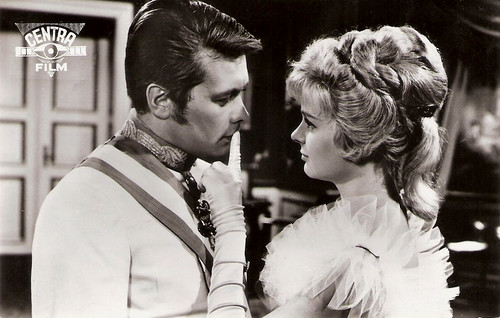
Dutch postcard by SYBA, no. 461. Promotional card for Centrafilm, Den Haag. Publicity still for Die Försterchristel/The Forester's Daughter (Franz Josef Gottlieb, 1962).
Scene from Mariandl (Werner Jacobs, 1961). Source: fritz51263 (YouTube).
Sources: Stephanie D'heil (Steffi-line), Prisma (German), Wikipedia, and IMDb.

German postcard by Krüger, no. 902/108. Photo: Bavariafilm. Publicity still for Junge Leute brauchen Liebe/Young People Need Love (Géza von Cziffra, 1961).
Star Maker
Peter Weck was born in Wien (Vienna), Austria, in 1930. At the age of 9, he became a member of the famous Wiener Sängerknaben (Vienna Boy's Choir), where he sang as a soprano soloist till 1940.
From 1949 to 1951, he studied piano, clarinet and bassoon at the Universität für Musik und darstellende Kunst Wien (Academy for Music and Performing Arts, Vienna). He stopped his musical studies and instead decided to become an actor. In 1953, he graduated at the Max Reinhardt Seminar of the same academy in Vienna.
After his stage debut in 1953 as Truffaldino in Carlo Goldoni's Servant of Two Masters at the Stadtheater Klagenfurt. During the 1950s, he also performed in Munich, Hamburg and Vienna. From 1959 till 1970, he played at the renowned Burgtheater in Vienna, where he also worked as a director. Between 1965 and 1976, he also worked for the Schauspielhaus in Zurich.
Like Romy Schneider he was discovered for the cinema by star maker Ernst Marischka. In 1954 he made his film debut in Bruder Martin/Brother Martin (Axel von Ambesser, 1954) with Paul Hörbiger.
Weck was often seen in uniform in costume dramas. Refreshingly natural and without pathos he performed such roles as Prince Heinrich von Oranien in Mädchenjahre einer Königin/The Story of Vickie (Ernst Marischka, 1954), and archduke Carl-Ludwig in Sissi (Ernst Marischka, 1955).
He also appeared in many Heimatfilms of the 1950s like Und der Himmel lacht dazu/And Love Laughs at it (Robert A. Stemmle, 1954), and Die Wirtin zur goldenen Krone/The Innkeeper of the Golden Crown (Theo Lingen, 1955).
In Die liebe Familie/Dear Family (Helmut Weiss, 1957), he combined boyish charm with energy and common sense. This unusual quality for a jeune premier made him soon the beloved Wiener Goldjungen of the German speaking entertainment cinema.

Dutch postcard. Sent by mail in 1964.

Dutch postcard.
Darling
Peter Weck intensified his film work in the 1960s, and he became a darling of the female public as the sympathetic Filou in Mariandl (Werner Jacobs, 1961) at the side of Conny Froboess.
Peter and Conny were co-stars in a series of Schlagerfilms: Wenn das mein großer Bruder wüßte/When My Big Brother Knew (Erik Ode, 1959), Meine Nichte tut das nicht/My Niece Doesn't Do That (Franz Josef Gottlieb, 1960), Junge Leute brauchen Liebe/Young People Need Love (Géza von Cziffra, 1961), Mariandl (Werner Jacobs, 1961), Der Traum von Lieschen Müller/The Dream of Lieschen Mueller (Helmut Käutner, 1961), Der Vogelhändler/The Bird Seller (Géza von Cziffra, 1962), Mariandls Heimkehr/Mariandl's Return (Werner Jacobs, 1962), and Ist Geraldine ein Engel?/Is Geraldine an Angel? (Steve Previn, 1963).
Stephanie D'heil writes at her website Steffi-line, that the media reported about a relationship between the two young stars, and they even suggested that they were engaged.
But in 1966 Peter Weck met former model Ingrid Muttone in the cafeteria of the Burgtheater. In 1967, she became his wife and they would have two children, Barbara and Philipp Daniel.

Dutch postcard by Int. Filmpers, Amsterdam, no. WPS 168. Photo: Centrafilm. Publicity still for Mariandl (Werner Jacobs, 1961).

Dutch postcard by Uitgeverij Takken, Utrecht, no. AX 4899. Photo: Hafbo Film. Publicity still for Junge Leute brauchen Liebe/Young People Need Love (Géza von Cziffra, 1961).

Dutch postcard by Gebr. Spanjersberg N.V., Rotterdam, no. 1314. Photo: Sascha-Gloria/Ufa.
Pater Familias
One of Peter Weck’s best roles was in The Cardinal (Otto Preminger, 1963) opposite Romy Schneider. He played a Jewish man who became so desperate after the Austrian Anschluss in 1938 that he committed suicide by jumping out of the window.
Later Weck worked in light entertainment films by directors like Franz Antel, Franz Josef Gottlieb, Harald Reinl, and especially Harald Vock.
In 1971 he became very popular as the partner of Fritz Eckhardt in the TV series Wenn der Vater mit dem Sohne/When Fathers and Sons. Another popular series was Ich heirate eine Familie/I Married a Family (1983), which he directed, and in which he also performed the role of the pater familias. The series won the Goldene Kamera award twice, in 1985 and 1986.
From 1983 till 1992 he also worked as the impresario of the Theater an der Wien in Vienna. During this period, the theatre was the location for some important premieres such as the German versions of the musicals Andrew Lloyd Webber's Cats (1983) - which was a huge success, Freudiana (1990) - which he also directed, and Elisabeth (1992). The latter, about the life of Austrian empress Elisabeth (Sissi), was performed in Vienna till 1998, without a break.
In 1993 Weck received the Ehrenkreuz für Wissenschaft und Kunst, Austria's highest decoration for scientists and artists. Many other awards and honours followed.
His last film appearance was in 1999 in the remarkable WWII love story Aimée & Jaguar (Max Färberböck, 1999). But Peter Weck is still working for TV, both as an actor and a director.
Since 1998, Peter Weck is the grandfather of Timon. In 2010, he published his memoirs War's das?: Erinnerungen (Was that it? Memories). Two years later, in 2012, his wife, Ingrid Weck, passed away.
His most recent screen role was in Erinnern/Recall (Michael Riebl, 2013), an episode of the Austrian crime series Schnell ermittelt/Fast Forward (2009-2013). Peter Weck lives in Vienna.

Dutch postcard by SYBA, no. 461. Promotional card for Centrafilm, Den Haag. Publicity still for Die Försterchristel/The Forester's Daughter (Franz Josef Gottlieb, 1962).
Scene from Mariandl (Werner Jacobs, 1961). Source: fritz51263 (YouTube).
Sources: Stephanie D'heil (Steffi-line), Prisma (German), Wikipedia, and IMDb.
No comments:
Post a Comment